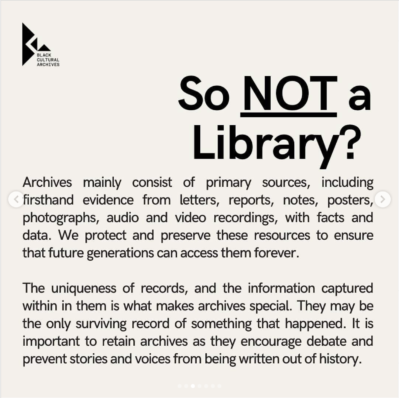A concept of Edward Said which “foregrounds the centrality of imperialisme to Western culture. The cultural archive has influenced historical cultural configurations and current dominant and cherished self-representations and culture.”
—Gloria Wekker
“An Archive is a single record or an entire collection of unique, irreplaceable, and valuable records —in any shape, media, or size— providing information about a place, institute, or group of people in order to preserve history.”
https://www.instagram.com/p/CQNtHH9h9H8/ & https://www.instagram.com/bcaheritage/
“An archive is an accumulation of historical records or the physical place they are located. Archives contain primary source documents that have accumulated over the course of an individual or organization’s lifetime, and are kept to show the function of that person or organization. Professional archivists and historians generally understand archives to be records that have been naturally and necessarily generated as a product of regular legal, commercial, administrative or social activities. They have been metaphorically defined as “the secretions of an organism”, and are distinguished from documents that have been consciously written or created to communicate a particular message to posterity.”
https://en.wikipedia.org/wiki/Archive
Cultural archive is a concept of Edward Said which “foregrounds the centrality of imperialisme to Western culture. The cultural archive has influenced historical cultural configurations and current dominant and cherished self-representations and culture.” (Wekker, 2016,p 2) Said describes the cultural archive as a storehouse of “a particular knowledge and structures of attitude and reference” and “structure of feelings”. A racial grammar, as deep structure of inequality in thought and affect based on race, was installed in nineteenth-century European imperial populations and that it is from this deep reservoir, the cultural archive, that, among other things, a sense of self has been formed as fabricated.




















